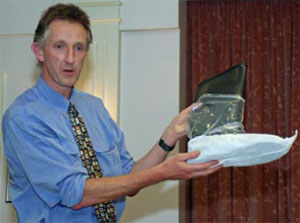
Taken from the Ranger magazine www.theranger.co.uk
Eggs from flocks infected with salmonella will be banned from retail sale from November if they are linked to an outbreak of food poisoning.
This latest regulation was passed by officials in Brussels last month as part of EU zoonoses control measures. It means that from 1 November where an "epidemiological investigation" identifies salmonella in a flock of hens as the source of a food-borne outbreak in humans—from either eggs or egg products—then the eggs from that flock will be diverted for heat treatment and subsequent processing.
And the rules apply to all 2,000-plus salmonella types, not just enteritidis and typhimurium which are the two species
being targeted by compulsory sampling and testing which commences next year.
Commenting on the new ruling, Mark Williams, chief executive of the BEIC which has been leading the UK’s lobbying efforts, said he was not happy with the inclusion of all salmonella types and had lodged this objection with Defra.
"Neither will we accept a producer having to take the blame for poor practice further down the food chain," said Mr
Williams. "We will expect a full scientific investigation to be carried out before a flock is blighted."
For flocks not linked to a food poisoning outbreak but identified as being infected with either Salmonella typhimurium or Salmonella enteritidis as the result of the new environmental tests which become mandatory from next February, the EU has confirmed that any eggs from such flocks must be heat-treated from January 2009.
But after successful lobbying by member states, including the UK, producers will now be able to opt for confirmatory testing of eggs. As the rules stand, a positive based on
a routine environmental sample of either boot swabs or droppings submitted by a producer will lead to a repeat sampling of the environment.
If this second test is also positive then restrictions will be applied to the sale of eggs from the affected flock. It is then down to the producer to decide whether to opt for
confirmation via a further environmental test or alternatively by the sampling of internal organs from 300 birds or the pooled contents of 4,000 eggs, including the shells. The full cost of the testing—estimated to be around
£2,000 for the egg test—will have to be borne by the producer.
While the inclusion of eggs as a means of confirmation has been welcomed it has led to producers questioning the reasoning behind the insistence on a 4,000 egg sample
regardless of flock size.
At the Exeter round of the BEIC’s series of Zoonoses Roadshows, the question was asked why a producer with, say, 1,500 birds would have to submit the same size sample
as a cage producer with tens of thousands of birds.
According to Rob Davis of Defra’s Veterinary Laboratories Agency (VLA) the sample size is not related to flock size but the detection rate in eggs. "4,000 eggs is needed to give a reasonable level of statistical confidence that Salmonella egg ban from the autumn the proportion of positive eggs from a positive house is no greater than that found in UK eggs on general sale in the 2003 FSA
survey—around 1 in 1740," said Mr Davis.
Concerned producers at the Roadshow also wanted to know what the likelihood was of finding infection in eggs following positive environmental samples.
"Is it worth spending £2,000 on testing an egg sample," asked one producer, "or will it simply turn up another positive?"
Mr Davis’s view was that the decision on whether to go for additional voluntary confirmation testing and which test to go for would need to be made on a case-by-case basis by the producer and attending veterinary adviser.
"If the environment is heavily contaminated or a high proportion of birds are infected then the likelihood is that eggs will be contaminated—especially on shells,"
he said. "If infection is light and egg collection systems are clean then eggs may not be significantly contaminated.
"Negative egg results are also more likely with St than Se.
In most cases involving Se it is likely that the 300 bird PM test would be more likely to be negative than the 4,000 egg test."
There were also calls at the meeting for producers to be fully compensated if a confirmatory test proved that a flock was clear of infection. The BEIC’s Mark Williams
promised to take it up with Defra but said it would not be easy against a Government strategy of cost-sharing when it came to disease control.
